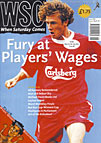 Dario Gradi's desire to develop young talent at Crewe has been, and will continue to be, key to the clubs's surival in a time of ever-increasing transfer fees and wage demands. Paul Wilkinson explains
Dario Gradi's desire to develop young talent at Crewe has been, and will continue to be, key to the clubs's surival in a time of ever-increasing transfer fees and wage demands. Paul Wilkinson explains
Imagine if you can a league table topped by Manchester United, Everton and Crewe Alexandra. This was Group A of the FA Premier Academy League (Under-19s) this season. Crewe struggled in their second season in the First Division, but their youth sides were beating the best that the Premiership clubs could offer.
That they eventually staved off relegation while sustaining such high standards at youth level was perhaps the most remarkable achievement yet for Dario Gradi, the professional game’s longest-serving manager. Since his arrival in June 1983, Gradi has taken Crewe from the depths of the old Fourth Division, supported by a youth set-up renowned for developing talent and selling it on.
David Platt, Geoff Thomas, Neil Lennon and Robbie Savage all spent time at Gresty Road after Gradi signed them from other clubs. But now the home-grown talent is also making its mark. Following Rob Jones, the system has produced Danny Murphy (sold to Liverpool) and Dele Adebola (now at Birmingham).
The latest candidate is Seth Johnson, spotted as an 11-year-old during a pre-season tour of the South West. He made his first full appearance aged 17 in early 1997, playing as a left wing-back, a position where he has earned England Under-18 and Under-21 caps, but today he is normally in midfield, which has led to slightly overhyped references to “the new Bryan Robson”.
Johnson was linked with Sheffield Wednesday, Blackburn and Crewe’s “alliance” partners, Liverpool, but, as the transfer deadline approached, he looked to be on his way to Derby County. Gradi travelled down to the Bournemouth base of the England Under-21s to talk to Johnson about what – at a rumoured £3 million – would have been a club record transfer. However, Johnson rejected the move to Pride Park, deciding that his loyalties were to Gradi and Crewe’s fight to stay in the First Division. Fittingly, he scored the crucial goal in a 1-0 victory over Bristol City that paved the way for the Alex’s survival this season.
Another candidate for greater things is defender David Wright. Already a regular in the England Under-18s, Wright has become the first-choice right-back. Both he and Johnson owe their prominence to the youth system to which Gradi has devoted so much time and effort (he manages the Under-14s as well as the senior squad). The club boasts state-of-the-art training facilities, with a separate astroturf complex and an indoor sports hall under construction to meet Football Academy criteria. Crewe were one of only four Nationwide League sides to earn this status last May.
With the club struggling in the First Division, some wondered if there was too much focus on the youth set-up. “Ninety per cent of fans want to see results this Saturday, not two years down the line,” said one critic. Others trusted Gradi to come up with the goods. Sure enough, Johnson and Wright made their mark, Murphy returned from Liverpool on loan and one of Gradi’s more erratic talents, Mark Rivers, began to play out of his skin. The result: survival with a week to spare.
Despite seven months in the relegation zone, you won’t find any Alex fans saying Gradi should go. Against a background of spiralling transfer fees, wages and bankruptcies, most know that the youth system is vital to Crewe’s survival. As Gradi says: “We can stay full-time as long as we continue to sell players. If we started our production line today it would us take eight years to get into the position we are in now.”
From WSC 148 June 1999. What was happening this month